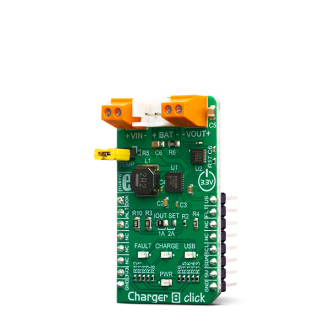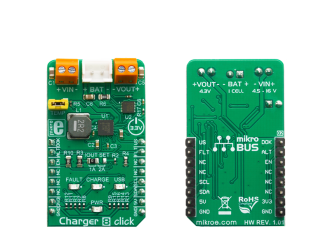
We strongly encourage users to use Package manager for sharing their code on Libstock website, because it boosts your efficiency and leaves the end user with no room for error. [more info]

Rating:
Author: MIKROE
Last Updated: 2019-03-14
Package Version: 1.0.0.0
mikroSDK Library: 1.0.0.0
Category: Battery Charger
Downloaded: 5329 times
Not followed.
License: MIT license
Charger 8 Click is an intelligent Li-Ion battery charger, system power manager, and a battery fuel gauge Click board. As a system power distributor, it can supply up to 2A to a connected load.
Do you want to subscribe in order to receive notifications regarding "Charger 8 click" changes.
Do you want to unsubscribe in order to stop receiving notifications regarding "Charger 8 click" changes.
Do you want to report abuse regarding "Charger 8 click".


Library Description
The library initializes and defines the I2C bus driver and drivers that offer a choice for writing data in register/NV memory and reading data from register/NV memory. The library includes function to read the battery diagnostics. The user can set the maximum battery capacity to have a good reading of the current capacity of the battery. The user has a function for enable/ disable device, sets Alert mode and usb suspand mode.
Key functions:
void charger8_enable(uint8_t enable) - Functions for enable or disable device.float charger8_getCurrent() - Functions for reading the current charging battery.float charger8_getVoltage() - Functions for reading the voltage of the battery.void charger8_reset() - General reset procedure.Examples description
The application is composed of the three sections :
Note: The user can charge a battery internally over mikroBUS or externally by supplying the VIN connectors with 5V. For more precise diagnosis and easier tracking of the charging battery status you can set its capacity - e.g. if you have a 2000mAh battery you can use the "charger8_setMaxBatteryCapacity()" function and pass the parameter for 2000mAh, by doing this you make the readings more precise. In the example we used only some possibilities of the diagnostics like temperature of the chip during charging, charging current, current battery voltage, current battery capacity and how much the battery is charged in percentage. In case of changing the battery to a different one, it is neccessary to reset the device and set the battery's maximum capacity.
void applicationTask()
{
float Temperature;
float Current;
float Voltage;
uint8_t SOC;
uint16_t Capacity;
char demoText[50];
mikrobus_logWrite(" - Battery diagnostics - ", _LOG_LINE);
/* Temperature */
Temperature = charger8_getTemperature();
FloatToStr(Temperature, demoText);
mikrobus_logWrite(" - Temperature : ", _LOG_TEXT);
mikrobus_logWrite(demoText, _LOG_TEXT);
mikrobus_logWrite(" C ", _LOG_LINE);
/* Current */
Current = charger8_getCurrent();
FloatToStr(Current, demoText);
mikrobus_logWrite(" - Current : ", _LOG_TEXT);
mikrobus_logWrite(demoText, _LOG_TEXT);
mikrobus_logWrite(" mA ", _LOG_LINE);
/* Voltage */
Voltage = charger8_getVoltage();
FloatToStr(Voltage, demoText);
mikrobus_logWrite(" - Voltage : ", _LOG_TEXT);
mikrobus_logWrite(demoText, _LOG_TEXT);
mikrobus_logWrite(" mV ", _LOG_LINE);
/* Capacity */
Capacity = charger8_getCapacity();
IntToStr(Capacity, demoText);
mikrobus_logWrite(" - Capacity : ", _LOG_TEXT);
mikrobus_logWrite(demoText, _LOG_TEXT);
mikrobus_logWrite(" mAh ", _LOG_LINE);
/* SOC */
SOC = charger8_getSOC();
IntToStr(SOC, demoText);
mikrobus_logWrite(" - SOC : ", _LOG_TEXT);
mikrobus_logWrite(demoText, _LOG_TEXT);
mikrobus_logWrite(" % ", _LOG_LINE);
mikrobus_logWrite(" -------------------------- ", _LOG_LINE);
Delay_ms( 1500 );
}
Other mikroE Libraries used in the example:
I2CUARTConversionsAdditional notes and informations
Depending on the development board you are using, you may need USB UART click, USB UART 2 click or RS232 click to connect to your PC, for development systems with no UART to USB interface available on the board. The terminal available in all MikroElektronika compilers, or any other terminal application of your choice, can be used to read the message.